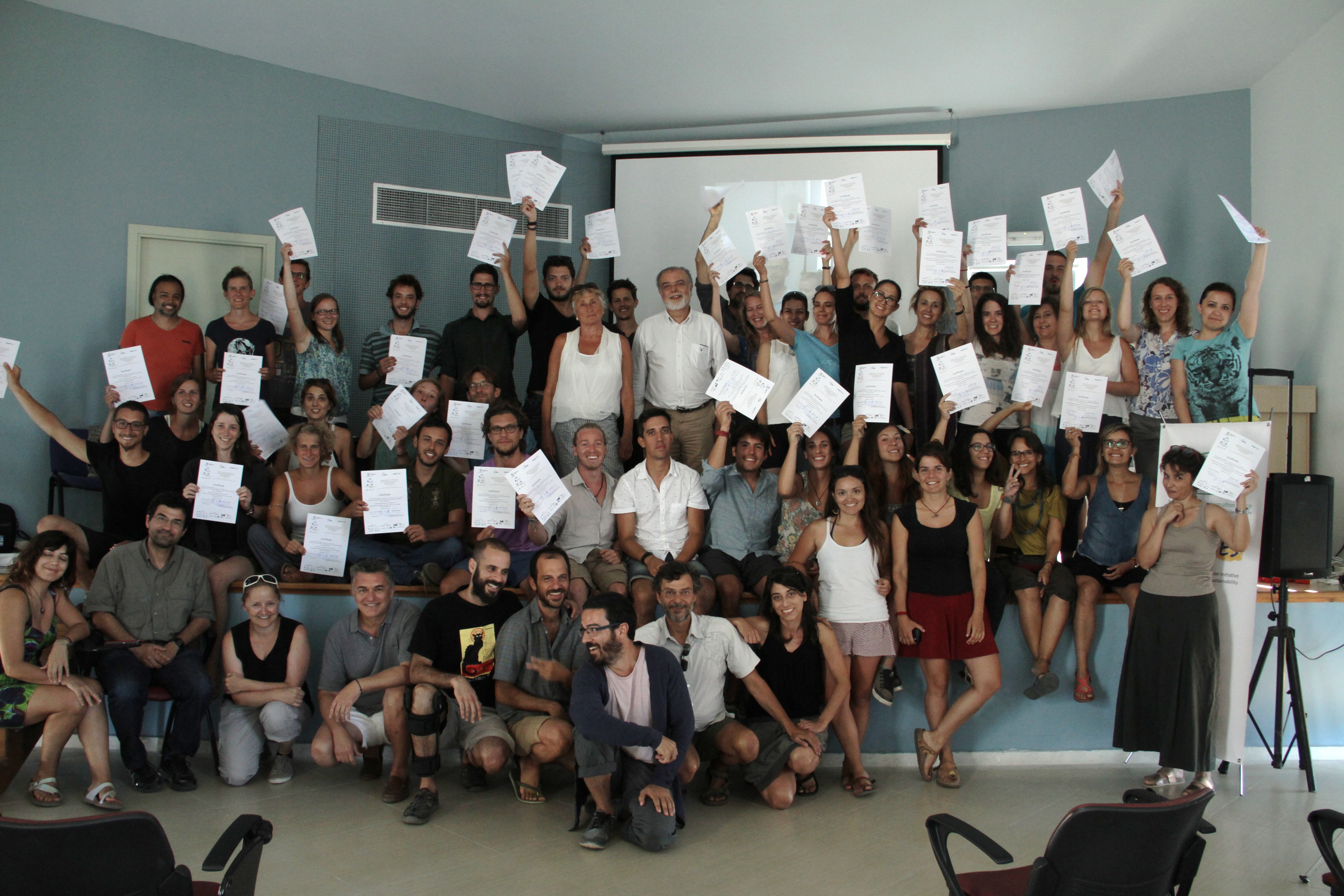Between 9-22 July 2016 we organised the third “Summer University” on Samothraki, on “Integrated Management Approaches for Biosphere Reserves and other Designated areas”, in collaboration with several research institutions, universities, local and national authorities, NGOs, as well as key UNESCO branches. The course, designed as an intensive, innovative, multidisciplinary and experiential 12-day training, aimed at providing high quality education to around 70 post-graduate students and young scientists from European countries and beyond. Its main aim was to deepen the understanding of the value of Biosphere Reserves, as “laboratories” and “catalysts” of sustainable development.
Course A “Aquatic & Social Ecology: Theory and Practice”, hosted by the Vienna Institute of Social Ecology and the Hellenic Centre for Marine Research, was designed as a 2-week course with the aim to learn and apply aquatic ecology and social ecology approaches in a local setting while supporting current research and building synergy with the UNESCO Biosphere Reserve process. The course thus gave student the opportunity to engage in a real-life project and utilise their scientific training to support the process further, namely the creation of a management plan with a set of activities towards sustainability, and a science plan for further research on the island that would also meet local interests.
Plenaries included lectures from Marina Fischer-Kowalski, Philippe Pypaert, Michael Scoullos, Núria Bonada, Klement Tockner and Danka Thalmeinerova. Yet, for the most part, students were split in small groups and conducted fieldwork in an array of social and natural science methods frequently used in socioecological and aquatic research. Each method was practically demonstrated by a tutor guiding the small student groups throughout the field work. In line with our applied, practical goals, we have again planned the modules of the excursion as small sub-projects in such a way that they contribute to current research directions, often directly responding to requests by the commune. In total 8 such modules were performed:
- (1) Animal numbers and their drivers on the island: livestock counting and estimation of livestock densities on different habitat types by distance sampling. Analysing farmers’ income by sources (utilization of animal products on markets, in subsistence, from state subsidies). Creating an empirically based estimate of current livestock numbers and putting it into perspective of causes and impacts (tutor: Raffael Hickisch)
- (2) Problems of overgrazing and soil erosion: Analysing the impacts of agricultural land use and land-cover change on the vegetation cover. Mapping vegetation cover and erosion sites, discussing landscape change, its drivers and impacts. Exploring the outcomes of recent animal feed seeding experiments (tutor: Tamara Fetzel)
- (3) Exploring the current social metabolism of the island in terms of material and energy flow analysis by field observation and expert interviews, with a special focus on the fate of wastes. Exploring potential social tipping points (undersupply that might cause population decline) in the health and education services. Structural legal and statistical analysis and stakeholder interviews (tutors: Simron Singh, Panos Petridis)
- (4) Local initiatives and their chances to drive socioecological change. Oral narratives and interviewing with local initiatives on whether cultural change toward collaboration may occur and widen the range of possible solutions even during a prolonged economic deadlock (tutors: Aggelos Varvarousis, Panos Petridis)
- (5) Aquatic chemistry and macroinvertebrate fauna of Mediterranean streams. Field protocols, field measurements and sampling campaigns in streams of Samothraki will be carried out in order to explore biodiversity issues, assess their ecological status and interpret the factors and processes that control it (tutors: Nikos Skoulikidis, Anastasia Lampou, Momir Paunović)
- (6) Stream riparian and landscape module. Visual survey techniques were utilized to collect floral, wildlife and anthropogenic degradation data to assess ecosystem integrity at the riparian corridor and landscape scale. Three survey methods were completed at a number of stream sites (tutors: Stamatis Zogaris, Vasiliki Vlami, Panayiotis Dimopoulos)
- (7) River hydrology, physical processes, stream hydrologic assessment, watershed assessment. Water resources management, watershed management. Survey to conceive the island’s water resources management scheme, including an estimation of water uses and understanding of common irrigation practices. (tutor: Ierotheos Zacharias)
- (8) Visual survey techniques, protocols and indicators for the ecological assessment of the Mediterranean sublittoral zone, with emphasis on benthic ecosystem structure and functions. Fieldwork to collect data within the island’s marine Site of Community Importance (GR1110012). Analyze and report on identified status and trends (tutors: Maria Salomidi, Yiannis Issaris, Eleni Kytinou)
All trainers and organisers have produced a joint statement in support to the accession of Samothraki to the Directory of the World Network of Biosphere Reserves (WNBR).
The final reports are now published in a special issue of Sustainable Mediterranean!
Further Information
Press Release from the Municipality of Samothraki (in Greek)


